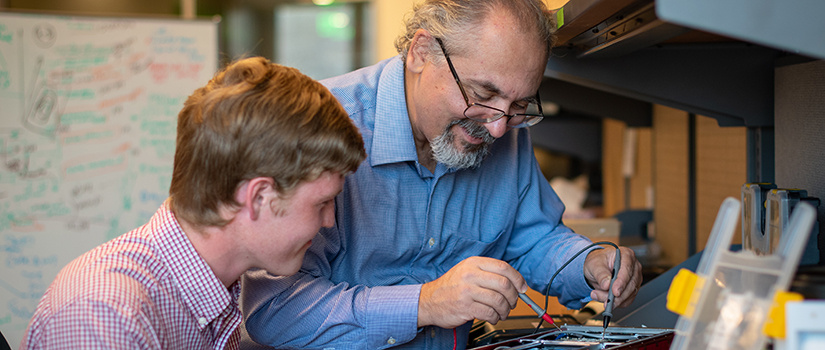By Abe Danaher | April 27, 2020
Ioannis Reklietis received a 2020 NSF Early CAREER Development Award to continue his research in underwater robotics. Through a three-pronged approach, Rekleitis plans to increase the autonomy of his robots to allow for improved shipwreck mapping, coral reef monitoring, and underwater cave exploration and surveying.
The five-year, $550,000 grant titled “Enabling Autonomy via Enhanced Situational Awareness for Underwater Robotics,” began March 15.
Rekleitis is a computer science and engineering assistant professor at the University of South Carolina College of Engineering and Computing whose research focuses on a variety of robotic systems, including underwater, space, and multi-robot systems. His recent research using Jetyaks and Aqua2 robots started exploring the environmental benefits that autonomous robotic systems can bring to the earth’s waters. The NSF CAREER award will allow him to further this research as he works toward his ultimate goal of creating a reliable, fully autonomous, robot.
“I’m hoping that by the end of this award, we will have the capabilities of operating in normal conditions, let’s say over a shallow shipwreck, up to 100 feet,” Rekleitis says. “That the robot is able to know where it is no matter what and that it is working 100 percent of the time. And also, that the robot is able to navigate around obstacles in order to reach its goals.”
To achieve this, Rekleitis must overcome three challenges that his current research team faces. First, he must improve the robot’s ability to understand its location underwater. Without an underwater global positioning system (GPS), his robots currently rely on an advanced state-estimation algorithm that allows the robots to know their location based upon their physical surroundings, such as the cave walls around them or the sea floor beneath them.
However, this system is not completely reliable due to the poor visibility posed by some aquatic environments such as dark caves and murky waters. This grant will allow him to incorporate acoustic sensing to his pre-existing state-estimation technology so that the robots’ reliability greatly increases, regardless of their environment.
Rekleitis is also aiming to improve the robots’ ability to avoid obstacles, such as corals, rocks, and shipwreck structures, and also to provide them with rudimentary navigation systems so that if their sensors temporarily cut out, they can still continue forward without becoming lost or returning back to the surface of the water.
The most important thing, he says, is taking “baby steps” forward, so that the robots’ reliability improves along with their capabilities. He says, “If you have a robot and it costs $100,000 to $200,000, I cannot tell you that if we deploy it 100 times, five times we are not going to get it back because it’s going to get lost. Nobody would accept that. Hopefully, in four years, we can say it will come back 100 out of 100 times.”
His robotic systems are already surveying the topography of riverbeds, assessing the health of coral reefs, monitoring harmful algae blooms, and increasing the safety of aquatic navigation by accurately mapping shipwrecks. At the grant’s end in 2025, he hopes that these benefits can be provided more efficiently and effectively by autonomous robots.
Rekleitis began as an assistant professor at UofSC in 2014. He received the 2018 UofSC Breakthrough Award for his robotics research and was an IROS ICROS Best Application Paper Award finalist in 2019.
He received his doctorate from McGill University in 2003, where he specialized in mobile robotics, multi-robot localization and exploration. He also has a master’s from McGill University, and a Bachelor of Science from the Department of Informatics at the University of Athens, Greece.
CAREER: The Faculty Early Career Development Program offers the National Science Foundation's most prestigious awards in support of early-career faculty who have the potential to serve as academic role models in research and education and to lead advances in the mission of their department or organization. Rekleitis’ award is under the division of the NSF Information and Intelligent Systems.
